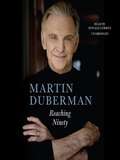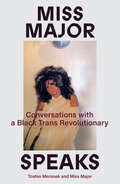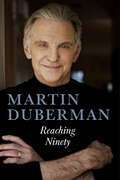Title search results
Showing 1 - 3 of 3 items

Reaching ninety
By Martin Duberman. 2023
DAISY audio (Direct to player), DAISY audio (Zip)
Politics and government biography, LGBTQ+ biography, Journals and memoirs
Human-narrated audio
Martin Duberman, one of the LGBTQ+ community's maverick thinkers and historians, looks back on ninety years of life, his history…
in the movement, and what he's learned. In the early sixties, Martin Duberman published a path-breaking article defending the Abolitionists against the then-standard view of them as "misguided fanatics." In 1964, his documentary play, In White America, which reread the history of racist oppression in this country, toured the country-most notably during Freedom Summer-and became an international hit. Duberman then took on the profession of history for failing to admit the inherent subjectivity of all re-creations of the past. He radically democratized his own seminars at Princeton, for which he was excoriated by powerful professors in his own department, leading him to renounce his tenured full professorship and to join the faculty of the CUNY Graduate School. At CUNY, too, he was initially blocked from offering a pioneering set of seminars on the history of gender and sexuality, but after a fifteen-year struggle succeeded in establishing the Center for Gay and Lesbian Studies-which became a beacon for emerging scholars in that new field. By the early seventies, Duberman had broadened his struggle against injustice by becoming active in protesting the war in Vietnam and in playing a central role in forming the National Lesbian and Gay Task Force and Queers for Economic Justice. Down to the present-day he continues through his writing to champion those working for a more equitable society
Miss Major Speaks: Conversations with a Black Trans Revolutionary
By Toshio Meronek, Miss Major Griffin-Gracy. 2023
Braille (Contracted), Electronic braille (Contracted), DAISY Audio (Direct to Player), DAISY Audio (Zip), DAISY text (Direct to player), DAISY text (Zip), Word (Zip), ePub (Zip)
LGBTQ+ biography, Politics and government biography, Biography
Synthetic audio, Automated braille
The future of Black, queer, and trans liberation explored by a legendary transgender elder and activist Miss Major Griffin-Gracy is…
a veteran of the infamous Stonewall Riots, a former sex worker, and a transgender elder and activist who has survived Bellevue psychiatric hospital, Attica Prison, the HIV/AIDS crisis and a world that white supremacy has built. She has shared tips with other sex workers in the nascent drag ball scene of the late 1960s, and helped found one of America&’s first needle exchange clinics from the back of her van.Miss Major Speaks is both document of her brilliant life–told with intimacy, warmth and an undeniable levity-and a roadmap for the challenges black, brown, queer and trans youth will face on the path to liberation today.Her incredible story of a life lived and a world survived becomes a conduit for larger questions about the riddle of collective liberation. For a younger generation, she warns about the traps of &‘representation,&’ the politics of 'self-care,' and the frequent dead-ends of non-profit organizing; for all of us, she is a strike against those who would erase these histories of struggle.Miss Major offers something that cannot be found elsewhere: an affirmation that our vision for freedom can and must be more expansive than those on offer by mainstream institutions.
Reaching Ninety
By Martin Duberman. 2023
Braille (Contracted), Electronic braille (Contracted), DAISY Audio (Direct to Player), DAISY Audio (Zip), DAISY text (Direct to player), DAISY text (Zip), Word (Zip), ePub (Zip)
LGBTQ+ biography, Politics and government biography
Synthetic audio, Automated braille
Martin Duberman, one of the LGBTQ+ community's maverick thinkers and historians, looks back on ninety years of life, his history…
in the movement, and what he's learned. In the early Sixties, Martin Duberman published a path-breaking article defending the Abolitionists against the then-standard view of them as "misguided fanatics." In 1964, his documentary play, In White America, which reread the history of racist oppression in this country, toured the country—most notably during Freedom Summer—and became an international hit. Duberman then took on the profession of history for failing to admit the inherent subjectivity of all re-creations of the past. He radically democratized his own seminars at Princeton, for which he was excoriated by powerful professors in his own department, leading him to renounce his tenured full professorship and to join the faculty of the CUNY Graduate School. At CUNY, too, he was initially blocked from offering a pioneering set of seminars on the history of gender and sexuality, but after a fifteen-year struggle succeeded in establishing the Center for Gay and Lesbian Studies—which became a beacon for emerging scholars in that new field. By the early Seventies, Duberman had broadened his struggle against injustice by becoming active in protesting the war in Vietnam and in playing a central role in forming the National Lesbian and Gay Task Force and Queers for Economic Justice.Down to the present-day he continues through his writing to champion those working for a more equitable society.